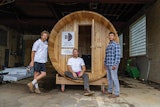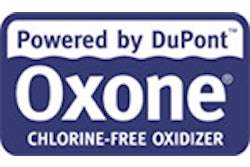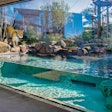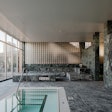
It was his time talking with and learning from his colleagues in the homebuilding field that had the greatest effect on him.
"With green building, the builders are, I think, steps ahead of the pool builders," he says. "That really makes me eager to stay up to par with what they're doing. If they're building a green house, I want to make sure that our pool is just as green and that it isn't going to be the gas-guzzler in the backyard of this efficient home they just built."
AQUA caught up with Brown between digs to see how he's employed what he's learned.
Let's start by getting your definition of green building.
Well, anybody can go out and buy a pump that's labeled "green" or a system that's labeled "green." But the most important thing to remember is that none of these green options will do the client any good if the hydraulic engineering of the pool is not well thought out. So if you have a subcontractor plumber come in and he's just putting in 90 after 90 after 90 when he really doesn't need all that, then you come in with this green system, well, you're really kind of cancelling it all out. As a builder, you've really got to think the thing out, step by step, to make sure you have the least amount of 90s and Ts and 45s as possible to get the job done. Then you use a great green system, whatever the brand may be, and you're really making progress.
It seems like some builders are just worried about hiding the equipment and end up shoehorning everything into a small area.
Yeah, and when you do that, you get a really awkward equipment setup where you're trying to literally put things on top of each other. When you do that you have to get really creative with the plumbing to make it all hook up, and sometimes it turns out there's a lot of 90s. I use the Jandy Versa-Plumb system, and right out of the box these items - the filter, the pump, the heater - all come with these sweeps that connect right into each other. So it can all be plumbed without any PVC. They've engineered this system so that it's very tight, just one sweep from the pump right into the filter. It's designed with maximum efficiency, and you can tell just by looking at it that's it's been meticulously thought out. It's allowed us to keep the cost of all the additional cutting and 90s and all that out of the system altogether. It saves us money and it saves the homeowner money. So it's a win-win, the way I see it.
I'm sure customers appreciate that.
Most of the time the clients we deal with rely on and trust us to install the best product in their pool and with their best interest in mind. Most people that we do business with don't care whether it's a 1 horsepower or 2 horsepower or 3 or how it's all set up. They're just concerned about the looks. So with that trust we can really get in there and do some good things.
We can help past customers improve their efficiency, too. We offer a free "green inspection," where I personally go out and analyze how their pools are running, if things are running more than they should, things like that. And if the clients want we can take things down, do some math and figure out what the minimum turnover is, and put that on. And just by doing an easy change like that you can cut your power bill for your pool in half.
And I'll tell you, I have personal experience to back that up. I have a show pool at my office. It was October or November last year, going into the off-season, and it was just kind of cloudy outside, so people weren't coming out to see the show pool. But we were still running all these features, and our power bill was about $300 a month.
So I went into my automation unit, turned everything down to the bare minimum, and then I had the idea that I'd only turn things on when the clients showed up to look at it over the winter. I cut that power bill from $300 down to about $120. So I was able to save a ton of money. Granted, I've got more pumps on that pool than most average pools because of all the features I've got, but it was exciting. So we decided at that point to pass that on to the client. You know? You don't need to run your vanishing edge for 12 hours. You don't need to run your water features for 12 hours a day. You don't need the lights to come on every night. So those free green inspections have really been nice. People have really opened up to it. They're excited and we haven't had anybody say, "No, don't come by." It doesn't cost us anything, it doesn't cost them anything, and it saves them money. Also, it possibly gets us a referral.
Aside from the equipment aspect, how do you make clients' pools greener?
Well, before we ever get started we're required to provide a silt fence plan to the county for review. And they'll monitor that throughout the building process. So if you have a breach in your silt fence and you don't notice it, you can probably expect a fine. You've got to stay on top of that, especially if it rains, as it has recently. If there are issues, we'll catch them and fix them, so when the inspector comes out he'll see that we've done the work and there'll be no reason for a citation.
That part of the process is very important to us, because here in Georgia we have a lot of red clay, and if that gets into the lake it just dyes it red, pretty much.
Also, when we dig the pools we get out of the site quickly and effectively and without a big mess. Of course we don't want to leave big piles of dirt in the backyard. You have to put silt fence around those, too, so we try to get them taken care of as quickly as we can.
Anything else?
One thing we're really careful to do is to selectively remove trees from pool areas. We don't go in and clearcut the backyard. We'll walk through the yard with the client and flag each tree that needs to come out. We usually try to leave all the hardwoods that are not directly affected by the pool. But sometimes we'll get a client that just wants them out of there.
I don't imagine that sits too well with you.
No. We believe that in the final pool-scape the trees are very valuable. You can't pay to bring trees like that back. So we really recommend they take a second look before deciding to take down trees like that. That's just something we try to steer people toward. Because once they're gone, they're gone.
Do most customers "get it"? Is it easy to sell the green equipment and practices you're pushing for?
We live in an area where people come from all over the nation, and the people that are coming from out West, their first question is usually, "How economical can you get this?" They have to deal with that a lot out there, obviously. And so we're prepared to answer those questions.
What about everyone else?
They certainly want it from their homebuilders. But with a pool, it's harder for the customer to see. It's one of those things that one company could do a green system and a company next door can do a non-green system. And unless you tell the client, nobody will really know the difference.
It's something that I feel builders are really going to need to get on board with. And you can actually sell that. It takes a lot of extra work to figure out the plumbing properly, and the system costs a little extra. But at the end of the day when the client understands that you did all this extra work for them, they're just overjoyed and extremely happy to refer you to the next person down the street, because you really kept their best interest in mind.
I think that's really what's most important - keeping the client's best interest in mind and doing an install that is up to today's standards. Just going in and grabbing whatever horsepower you use just because you used it on the last pool is really not, in my opinion, the best thing to do. There's a lot of variables that make something run smoothly and efficiently, and those all need to be considered.
Do you think the industry is moving in that direction quickly enough?
There's a lot of education about green, a lot of people sharing knowledge about it. I think the guy that just delivers a package - the customer can get number one, two or three - those guys need to start offering a green option, as well.
But I believe in it, I've thought a lot about it, and we've shared these ideas in our board meetings before. There is a small group of people so far that realize this stuff can really work for the pool builder. It's a good thing. It's easy to understand, relatively inexpensive to utilize, and it gets you a lot of business. It's just a better thing to do in the long run.
And there are a lot of guys on the board who share my thoughts.
Any final thoughts?
We are definitely trying to stay in the loop and utilize what the manufacturers are coming up with. These products and ideas save people money, save energy and hopefully improve the overall view people have of the pool industry. We want people to see the pool industry as really trying hard to be responsible.











































